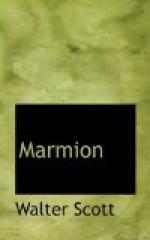the donjon keep. ’It is perhaps unnecessary to remind my readers, that the donjon, in its proper signification, means the strongest part of a feudal castle; a high square tower, with walls of tremendous thickness, situated in the centre of the other buildings, from which, however, it was usually detached. Here, in case of the outward defences being gained, the garrison retreated to make their last stand. The donjon contained the great hall, and principal rooms of state for solemn occasions, and also the prison of the fortress; from which last circumstance we derive the modern and restricted use of the word dungeon. Ducange (voce DUNJO) conjectures plausibly, that the name is derived from these keeps being usually built upon a hill, which in Celtic is called dun. Borlase supposes the word came from the darkness of the apartments in these towers, which were thence figuratively called Dungeons; thus deriving the ancient word from the modern application of it.’—Scott.
line 6. flanking walls, walls protecting it on the sides. Cp. the use of flanked in Dryden’s ‘Annus Mirabilis’ xxvi;—
’By the rich scent
we found our perfumed prey,
Which, flanked
with rocks, did close in covert lie.’
Stanza ii. line 14. St. George’s banner. St. George’s red cross on a white field was the emblem on the English national standard. Saint George is the legendary patron saint who slew the dragon.
Stanza iii. line 29. Horncliff-hill is one of the numerous hillocks to the east of Norham. There is a village of the same name.
A plump of spears. Scott writes, ’This word applies to flight of water-fowl; but is applied by analogy to a body of horse:—
“There is a knight
of the North Country,
Which leads a
lusty plump of spears.”
Flodden
Field’
line 33. mettled, same as metalled (mettle being a variant of metall, spirited, ardent. So ‘mettled hound’ in ‘Jock o’ Hazeldean.’ Cp. Julius Caesar, iv. 2. 23:—
’But hollow men,
like horses hot at hand,
Make gallant show
and promise of their mettle.’
‘Metal’ in the same sense is frequent in Shakespeare. See Meas. for Meas. i. I; Julius Caesar, i. 2; Hamlet, iii 2.
line 35. palisade (Fr. paliser, to enclose with pales), a firm row of stakes presenting a sharp point to an advancing party.
line 38. hasted, Elizabethanism = hastened. Cp. Merch. of Venice, ii. 2. 104—’Let it be so hasted that supper be ready at the farthest by five of the clock.’
line 42. sewer, taster; squire, knight’s attendant; seneschal, steward. See ‘Lay of the Last Minstrel,’ vi. 6, and note on Par. Lost, ix. 38, in Clarendon Press Milton:—
’Then
marshalled feast
Served up in hall with
sewers, and seneschals.’




